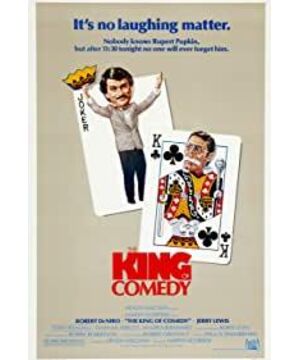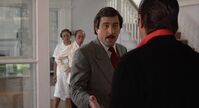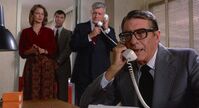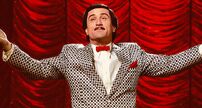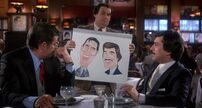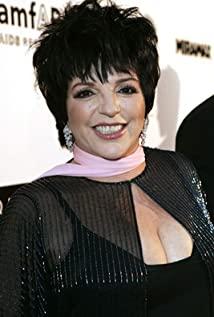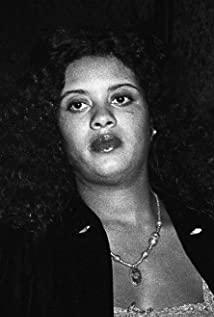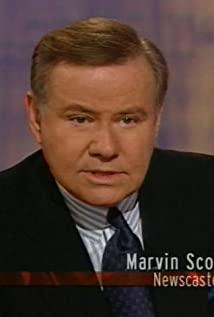Although "The King of Comedy" is not very successful at the box office, it is an important Scorsese film with the basic characteristics of a postmodernist film.
One of the main characteristics of postmodernist films is reflection and self-reflection, and reflection and self-reflection often use film and television itself as the subject of film creation. From this point of view, this feature of "The King of Comedy" is very obvious, which is the commentary on TV through film.
The "Jerry Langford Show" in the film obviously imitates the most popular "TV show tonight" in the United States-"The Johnny Carson Show". This show is similar to stand-up comedy in our country, using humor and jokes to please the audience, so that everyone can spend a pleasant evening. As the "King of Comedy", Johnny Carson is one of the highest paid TV actors in the United States. The film vividly imitates this popular program with realistic techniques. The beginning of the film is also the beginning of the "Jerry Langford Show": subtitles are superimposed on the color curtain, and the host announces that "it's Jerry Langford time", and then introduces the special guest and Lan Ford, Langford came out from behind the curtain and started to joke. These shots are almost point by point imitating the starting shots of the "Johnny Carson Show" in "Tonight TV" in real life. American audiences, or audiences who know the popular culture of American television, immediately have a sense of intimacy and humor when they see it, which triggers a burst of laughter and achieves an obvious comedic effect.
Since the advent of television, it has gradually replaced movies and entered thousands of households. It has become the most powerful communication medium for popularization and popular culture, and it has played an increasingly subtle role in people's daily life and ideological understanding. The United States is one of the earliest and most popular countries in the world for TV broadcasting. TV and movies have also become a hotbed for cultivating the "American Dream." Jerry Langford’s fame is a concrete manifestation of the "American Dream." Rupert Pupakin’s strong desire to become the new "King of Comedy" reflects the latent pursuit of the "American Dream." His desire urged him to take all means, even this extreme way of kidnapping, to achieve his goal. Pupakin's philosophy of life is: rather than being mediocre, it is better to be a glorious moment. In order to be the "king of comedy" for one night, he would rather go to jail for life to taste the taste of the bars. In his own words, "As long as one pays the price, one person can get everything he wants." The film vividly shows how he uses all means to realize the "American dream" of being the "king of comedy" overnight.
Postmodernism prompts people to think and discuss issues such as art, culture, and attitudes to life, and prompts people to keenly observe various contradictions in daily life. Reflective films after the Second World War have surpassed the transparency of films, seeing the internal structure of films, and letting people understand that films are produced and have profound connotations. In this way, the movie audience is not as a passive role, blindly absorbing all the information provided by the film, but actively participating in and thinking seriously, which is consistent with Brecht's alienation effect. The end of the film often best reflects the director's intentions. Pupakin was sentenced to six years in prison, but was released early after serving two years. After he was released from prison, he became a hero of various media, a cover character of magazines, and had his own show on TV, becoming the most popular "king of comedy". We don't know whether this ending is real or just his fantasy, and the director has not said clearly, but this is exactly the director's intention: to leave a question to the audience through an open ending.
This film uses comedy to guide the audience to think about sharp social issues: What are people thinking in a highly developed "post-industrial" society and information society like the United States? What are you pursuing? What does the crazy action of Pupakin and Martha show? What are the social and ideological roots of these crazy actions? … In the film, Scorsese did not give clear answers to these questions, nor would he answer them, because traditional films satisfy the audience’s hopes, while postmodernist films smashed the audience’s hopes and left enough for people. The room for thinking allows the audience to draw corresponding conclusions based on their own knowledge and experience.
In a highly developed capitalist society, due to the indifference of interpersonal relationships and the widespread use of high technology, people feel lonely. This is a common phenomenon in Western society, but this is only one side of the problem. The other side of the problem is that some famous Western film stars, because they can't bear the tremendous pressure of society and the fanatical pursuit of film and television fans, consciously live in isolation, "isolate" themselves, and seek a moment of peace. This film depicts Langford's mentality from this perspective.
Soon after the film began, outside the TV studio, there was a fanatical crowd vying for Langford's style and asking him to sign as a souvenir. The appearance of Langford pushed this enthusiasm to a climax. At this time, the director used a set of close and medium shots to allow us to observe his helpless facial expression and eagerness to get rid of the entanglement of the crowd. Finally, under the escort of the attendants, he hid in the car and was "suddenly attacked" by Martha. He escaped from the car and fell into the frenetic crowd. After Masha was dragged out of the car, Pupakin took the opportunity to drive him into the car, but sat next to him again. From then on, Pupakin haunted him like a ghost until the end of the film, making him restless.
Others are afraid of loneliness, but Langford pursues loneliness. This abnormal psychology is caused by objective circumstances. Following the camera lens, we saw him living alone in a big house, with no wife or children, and no relatives or friends other than his work partners. He often goes to the streets alone, occasionally greets pedestrians and TV fans, but refuses to contact anyone. He has a luxurious villa in the suburbs. Except for the two elderly male servants and maids, he is the only one living in the large villa. In the film, except for the initial crowd scenes and the final kidnapping scenes, he is always in a state of self-enclosed loneliness. Of course, this is not accidental, but the director deliberately arranged it to highlight his loneliness through camera movement.
In addition, the film also through the cross-editing of real and fantasy shots, allowing the audience to peek into the urgency of the little character Pupakin's fantasy to become famous, but the fantasy is sweet, and the reality is cold. The screen first showed Pupakin talking with Langford in the car and watching him return home, and then the camera cut to the two having lunch in a restaurant. At lunch, Langford asked Pupakin to replace himself as the "king of comedy" on TV for six weeks so that he could get a full rest, while Pupakin said that the time was too long to accept, but he was in Langford. De repeatedly begged and reluctantly accepted his request. In another set of footage, Pupakin gave the tape to Miss Long, and then the footage cut to Langford talking to Pupakin in his office, touting the latter’s comedic genius, and saying to Pupakin: "I I hate you, I am jealous of you" and invited Pupakin to take his girlfriend to his country house for the weekend. Then, the camera cuts to Langford walking on the street, followed by Martha. When Scorsese dealt with these two sets of shots, from reality to fantasy, and then from fantasy to reality, he did not use any explanatory shots, nor any hint to explain the conversion of the shots, but let the audience deconstruct them according to their own understanding.
Towards the end of the film, Langford was locked up in Martha's house by the kidnappers. At this time, the director used a metaphorical shot of overhead shots and asked Pupakin to circle around Langford, while turning Langford firmly to the chair with tape. The meaning of this metaphorical lens is obvious: Pupakin approached Langford with a strong desire, but it was impossible to reach the goal by going around, and finally had to tie him to a chair and use this This illegal method obtained the pass to the TV station to act as the "king of comedy" overnight.
Pupakin's philosophy of life is fully confirmed in this set of shots, and it also leaves a question worth pondering for the audience.
View more about The King of Comedy reviews


